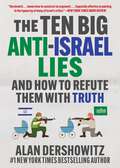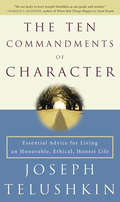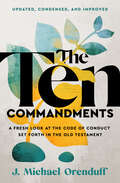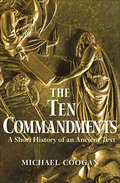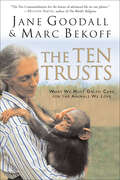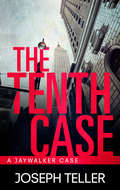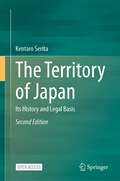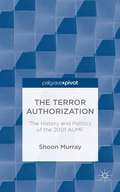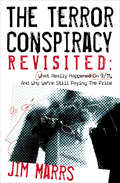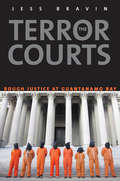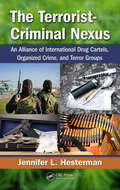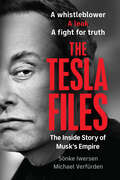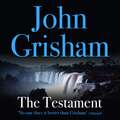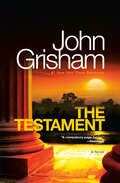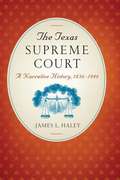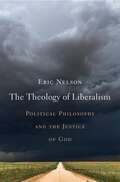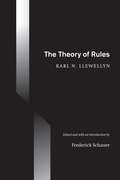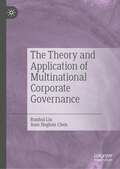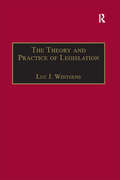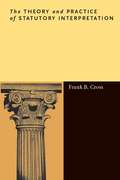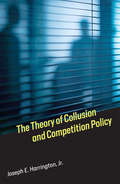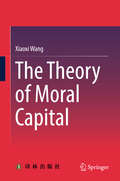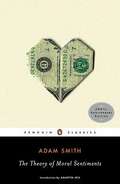- Table View
- List View
The Ten Big Anti-Israel Lies: And How to Refute Them with Truth
by Alan DershowitzThe goal of The Ten Big Anti-Israel Lies: And How to Refute Them with Truth is to contribute to the marketplace if ideas by offering truthful and well-documented facts that disprove the defamatory fictions—the big lies—that are pervasive in the current protests against Israel. The book&’s intended audiences are open-minded students and others who seek to hear fact-based information on all sides of the relevant issues. It is also designed to provide intellectual ammunition to pro-Israel students who seek to engage in exchanges with their anti-Israel interlocutors. It is hoped that this book, will help promote fact-based debate and dialogue about Israel and its enemies. As a lifelong Zionist and supporter—though often a critical supporter—of Israel, I am convinced that the unvarnished truth about all sides of the conflict will, if fairly assessed, refute the blood libels currently directed at the nation-state of the Jewish people. This book will demonstrate that the vast majority of accusations leveled by the anti-Israel protestors and professors are false. I will describe their ten central accusations about the past, the present, and the future, and then refute them with indisputable documentary, historical, and empirical evidence.
The Ten Commandments of Character: Essential Advice for Living an Honorable, Ethical, Honest Life
by Joseph TelushkinHere is a wealth of astute and warmhearted counsel on many of life's most difficult ethical dilemmas. Joseph Telushkin outlines his ten commandments of character, explaining why each one is so vital, and then addresses perplexing issues that can and often do crop up in our lives relating to family, friends, work, community, medical ethics, and money, such as: * How honest should you be when you are asked to give a reference? * How much assistance should you give your son with his college application essay? * Is it wrong to receive a kidney from an executed prisoner in China? * What should you do if your father begs you to end his life rather than allow him to descend into the hell of Alzheimer's? * Should a brother give up part of his inheritance if his sister has children and considerable expenses and he doesn't? * Should a dying woman reveal to her husband that their son is not really his? Many of us are finding it increasingly hard to tread the fine line between right and wrong. In The Ten Commandments of Character, Telushkin faces these issues squarely and shows us how to live a life of true integrity. "At a time when so many people are looking for moral guidance, we are lucky to have Joseph Telushkin as our guide and teacher. I am thoroughly impressed by his wisdom and good sense."--Rabbi Harold Kushner, author of When Bad Things Happen to Good People.
The Ten Commandments: A Fresh Look at the Code of Conduct Set Forth in the Old Testament
by J. Michael OrenduffAn award-winning author offers a fresh look at the code of conduct set forth in the Old Testament. The Ten Commandments are in dire need of an update. After all, how many of us truly understand what it means to covet something? Or what constitutes making a graven image? But how do we revise the Bible? Isn&’t it blasphemous to suggest that the Word of God needs improvement? Author J. Michael Orenduff, who taught philosophy and religion for forty years, is not proposing that we change God&’s words, but our understanding of them. The world has changed a great deal since the rules were handed down to Moses on Mount Sinai. And since we are no longer nomads roaming the desert, the time has come for an interpretation that provides meaning and guidance in today&’s complex society. For example, what exactly does honoring one&’s mother and father mean in a single-parent household—or one with two mothers? How should we interpret the command &“Thou shalt not kill&” when it comes to wielding a weapon in self-defense or on the frontlines of a just war? In an era when truth has become as variable as the individual broadcasting it on social media, shouldn&’t the rule about bearing false witness be broadened to hold more people accountable? In a warm, witty voice, Orenduff grapples with the moral code outlined in the Old Testament, examining differing theological traditions to offer an understanding of God&’s commandments that is accessible and meaningful for the modern reader.
The Ten Commandments: A Short History of an Ancient Text
by Michael CooganAre the Commandments really written in stone? A biblical scholar offers an &“engrossing and enlightening guide to one of the world&’s great legal codes&” (Booklist). In this lively, provocative book, Michael Coogan takes us into the ancient past to examine the Ten Commandments, also known as the Decalogue. How, among all the laws reportedly given on Mount Sinai, did the Ten Commandments become the Ten Commandments? When did that happen? There are several versions of the Decalogue in the Old Testament, so how have different groups determined which is the most authoritative? Why were different versions created? Coogan discusses the meanings the Ten Commandments had for audiences in biblical times and observes that the form of the ten proscriptions and prohibitions was not fixed—as one would expect since they were purported to have come directly from God—nor were the Commandments always strictly observed. In later times as well, Jews and especially Christians ignored and even rejected some of the prohibitions, although the New Testament clearly acknowledges the special status of the Ten Commandments. Today it is plain that some of the values enshrined in the Decalogue are no longer defensible, such as the ownership of slaves and the labeling of women as men&’s property. Yet in line with biblical precedents, the author concludes that while a literal observance of the Ten Commandments is misguided, some of their underlying ideals remain valid in a modern context.
The Ten Commandments: Still the Best Moral Code
by Dennis PragerThe most important words ever written are the Ten Commandments. These words changed the world when they were first presented at Mt. Sinai to Israelites, and they are changing it now. They are the foundation stones of Western Civilization. <p><p> Given their staggering importance, you would think that all societies, and certainly our educational and religious institutions, would be intent on studying them closely. Sadly, this is not the case. Our schools ignore them and our churches and synagogues take them for granted. But here's a simple test: Who among us can even name all of the Ten Commandments? And even among those who can name them, how many can explain them in a way that makes sense to the modern eye and ear? <p> If you are a person of faith, this book will strengthen it; if you are agnostic it will force you to rethink your doubts; if you're atheist, it will test your convictions. For people who have thought little about the Ten Commandments, as well as for those who have a sophisticated understanding of them, it will be a revelation. That's a lot to ask of a little book, but the only thing that's little here is the length. The ideas are very big.
The Ten Trusts: What We Must Do to Care for The Animals We Love
by Marc Bekoff Jane GoodallWorld-renowned behavioral scientists Jane Goodall and Marc Bekoff have set forth ten trusts that we must honor as custodians of the planet. They argue passionately and persuasively that if we put these trusts to work in our lives, the earth and all its inhabitants will be able to live together harmoniously. The Ten Trusts expands the concept of our obligation to live in close relationship with animals -- for, of course, we humans are part of the animal kingdom -- challenging us to respect the interconnection between all living beings as we learn to care about and appreciate all species.The world is changing. We are gradually becoming more aware of the damage we are inflicting on the natural world. At this critical moment for the earth, Goodall and Bekoff share their hope and vision of a world where human cruelty and hatred are transformed into compassion and love for all living beings. They dream of a day when scientists and non-scientists can work together to transform the earth into a place where human beings live in peace and harmony with animals and the natural world.Simple yet profound, The Ten Trusts will not only change your perspective regarding how we live on this planet, it will establish your responsibilities as a steward of the natural world and show you how to live with respect for all life.
The Tenth Case
by Joseph Teller"I love the dry wit of Teller's work. Nelson Demille meets Turow or Grisham!" --Goodreads review of Overkill A Jaywalker Case: Book 1 (originally published in 2008) Skirting the rules is his stock in trade, but this time criminal defense attorney Harrison J. Walker has gone too far and earned himself a suspension. Before his enforced vacation, he gets permission to clear his ten ongoing cases, and the tenth case will test everything he knows about winning. Samara Moss is the poster child for gold-diggers everywhere. She married an elderly billionaire when she was an eighteen-year-old ex-prostitute, and now she's stabbed him in the heart. Or has she? Jaywalker's not so sure. But is his determination to exonerate her driven by moral certainty, his driving need to win - or his desire for this particular client's undying gratitude? Don't miss a single one of Joseph Teller's award-winning Jaywalker novels: The Tenth Case Bronx Justice Depraved Indifference Guilty as Sin Overkill
The Territorial Jurisdiction of the International Criminal Court
by Michail Vagias John DugardThere are many variables of territoriality available to national courts under contemporary international law. Does the same apply to the International Criminal Court? And if so, what are the limits to the teleological expansion of the Court's territorial jurisdiction as regards, for example, partial commission of a crime in State not Party territory, crimes committed over the internet or crimes committed in occupied territories? Michael Vagias's analysis of the law and procedure surrounding the territorial jurisdiction of the Court examines issues such as the application of localisation theories of territoriality and the means of interpretation for article 12(2)(a); the principle of legality (nullum crimen sine lege) and human rights law for the interpretation of jurisdictional provisions; compétence de la compétence; crimes committed over the internet; and the procedure for jurisdictional objections.
The Territory of Japan: Its History and Legal Basis
by Kentaro SeritaThis Open Access book carefully examines the legal and historical bases of the territory of Japan as a modern State from the Meiji period to 2002. A new preface summarizes key developments in the situation up through 2022.Japan’s current territory is stipulated by the Potsdam Declaration (1945) and the Treaty of Peace with Japan (1951); it includes the Northern Territories, the Senkaku Islands, and Takeshima. Japan has demanded the return of the Northern Territories, comprising the islands of Etorofu, Kunashiri, Shikotan and Habomai, which are occupied by Russia. China has claimed sovereignty over the Senkaku Islands, which are validly controlled by Japan; Japan has claimed sovereignty over Takeshima, which is occupied by the Republic of Korea.This book analyzes the current status of these territorial topics, drawing on historical documents and international legal precedent, and it suggests peaceful methods to address them. In discussing territorial land, sea, and air space, this work touches upon postwar concepts defining modern international law and relevant rules on these subjects—exclusive economic zones (EEZs), continental shelves, and air defense identification zones (ADIZs)—found in international treaties, such as the United Nations Convention on the Law of the Sea (UNCLOS), and related domestic laws.
The Terror Authorization: The History and Politics of the 2001 AUMF
by Shoon MurrayThree days after September 11, 2001, Congress passed an unprecedented authorization of the use of military force (AUMF 2001) that remains in force today. As the theatre of operation against terrorism changes, the applicability and legality of the AUMF 2001 is under increasing scrutiny - giving way to academic discussion over its current status.
The Terror Conspiracy Revisited: What Really Happened On 9/11, And Why We're Still Paying The Price
by Jim MarrsThe New York Times bestselling journalist and leading conspiracy writer presents his latest findings on the truth behind the 9/11 terror attacks. The terror attacks of September 11, 2001 ushered the United States into an era of war across the Middle East and government surveillance at home. In The Terror Conspiracy Revisited, Jim Marrs updates his authoritative dissection of the official story of 9/11. This revised edition is packed with explosive material including: The revelations of former New Jersey attorney General John Farmer, who served as Senior Counsel to the 9/11 Commission: "At some level of the government, at some point in time. . .there was an agreement not to tell the truth about what happened."Commission cochairman Thomas Kean's suspicion of deceit: "We to this day don't know why NORAD told us what they told us. It was just so far from the truth."The conclusion of European scientists that there was nanothermite in the World Trade Center debris, a high explosive generally available only through the US military.The investigation by Pilots For 9/11 Truth and their conclusion that hijackers could not have accessed the cockpit of Flight 77. One thing we know to be true is that the full truth about the September 11th attacks has not yet been presented to the American public. Jim Marrs thoroughly dismantles the credibility of the US government's narrative and leaves the reader with some unsavory but indisputable conclusionsesented to the American public. Jim Marrs thoroughly dismantles the credibility of the US government's narrative and leaves the reader with some unsavory but indisputable conclusions.
The Terror Courts
by Jess BravinSoon after the September 11 attacks in 2001, the United States captured hundreds of suspected al-Qaeda terrorists in Afghanistan and around the world. By the following January the first of these prisoners arrived at the U. S. military’s prison camp in Guantanamo Bay, Cuba, where they were subject to President George W. Bush’s executive order authorizing their trial by military commissions. Jess Bravin, theWall Street Journal’s Supreme Court correspondent, was there within days of the prison’s opening, and has continued ever since to cover the U. S. effort to create a parallel justice system for enemy aliens. A maze of legal, political, and moral issues has stood in the way of justice—issues often raised by military prosecutors who found themselves torn between duty to the chain of command and their commitment to fundamental American values. While much has been written about Guantanamo and brutal detention practices following 9/11, Bravin is the first to go inside the Pentagon’s prosecution team to expose the real-world legal consequences of those policies. Bravin describes cases undermined by inadmissible evidence obtained through torture, clashes between military lawyers and administration appointees, and political interference in criminal prosecutions that would be shocking within the traditional civilian and military justice systems. With the Obama administration planning to try the alleged 9/11 conspirators at Guantanamo—and vindicate the legal experiment the Bush administration could barely get off the ground—The Terror Courtscould not be more timely.
The Terrorist-Criminal Nexus: An Alliance of International Drug Cartels, Organized Crime, and Terror Groups
by Jennifer L. HestermanPostmodern global terrorist groups engage sovereign nations asymmetrically with prolonged, sustained campaigns driven by ideology. Increasingly, transnational criminal organizations operate with sophistication previously only found in multinational corporations. Unfortunately, both of these entities can now effectively hide and morph, keeping law e
The Tesla Files: A Whistleblower, a Leak, a Fight for Truth: The Inside Story of Musk's Empire
by Sönke Iwersen Michael VerfürdenA whistleblower. A 100-GB-leak of confidential internal documents. A corporation in crisisA riveting tale of journalistic enterprise, ethics, and the courage to follow the evidence where it leadsThe 1st major work about Elon Musk and Tesla since Musk inserted himself directly into presidential politics and, through DOGE, into the lives of millions of AmericansWhen an anonymous whistleblower and former Tesla employee approached Germany&’s business newspaper Handelsblatt in November 2022, the newsroom was stunned. The allegations were astounding. Months of relentless investigation confirmed them to be true.In The Tesla Files, Handelsblatt journalists Sönke Iwersen and Michael Verfürden tell the full story. Drawing on 23,000 leaked documents, 100 gigabytes of confidential data, and hundreds of interviews with employees and customers, they deliver an unprecedented look inside the world&’s most secretive automaker.This is a portrait of a company that values hype over substance, and a CEO who demands devotion while ruling through fear. It also traces Elon Musk&’s ascent into the highest echelons of politics—marked by a pattern of obfuscation and manipulation.
The Testament
by John GrishamTroy Phelan is a self-made billionaire, one of the richest men in the United States. He is also eccentric, reclusive, confined to a wheelchair, and looking for a way to die. His heirs, to no one's surprise--especially Troy's--are circling like vultures.Nate O'Riley is a high-octane Washington litigator who's lived too hard, too fast, for too long. His second marriage is a shambles, and he is emerging from his fourth stay in rehab armed with little more than his fragile sobriety, good intentions, and resilient sense of humour. Returning to the real world is always difficult, but this time it's going to be murder.Rachel Lane is a young woman who chose to give her life to God, who walked away from the modern world with all its strivings and trappings and encumbrances, and went to live and work with a primitive tribe of Indians in the deepest jungles of Brazil.In a story that mixes legal suspense with a remarkable adventure, their lives are forever altered by the startling secret of The Testament.(P)2001 Random House, LLC
The Testament: A Novel (Pearson English Graded Readers Ser.)
by John Grisham#1 NEW YORK TIMES BESTSELLER • In a plush Virginia office, a rich, angry old man is furiously rewriting his will. With his death just hours away, Troy Phelan wants to send a message to his children, his ex-wives, and his minions—a message that will touch off a vicious legal battle and transform dozens of lives.Because Troy Phelan&’s new will names a sole surprise heir to his eleven-billion-dollar fortune: a mysterious woman named Rachel Lane, a missionary living deep in the jungles of Brazil.Enter the lawyers. Nate O&’Riley is fresh out of rehab, a disgraced corporate attorney handpicked for his last job: to find Rachel Lane at any cost. As Phelan&’s family circles like vultures in D.C., Nate goes crashing through the Brazilian jungle, entering a world where money means nothing, where death is just one misstep away, and where a woman—pursued by enemies and friends alike—holds a stunning surprise of her own.Don&’t miss John Grisham&’s new book, THE EXCHANGE: AFTER THE FIRM!
The Texas Supreme Court: A Narrative History, 1836-1986
by James L. Haley"Few people realize that in the area of law, Texas began its American journey far ahead of most of the rest of the country, far more enlightened on such subjects as women's rights and the protection of debtors. " Thus James Haley begins this highly readable account of the Texas Supreme Court. The first book-length history of the Court published since 1917, it tells the story of the Texas Supreme Court from its origins in the Republic of Texas to the political and philosophical upheavals of the mid-1980s. Using a lively narrative style rather than a legalistic approach, Haley describes the twists and turns of an evolving judiciary both empowered and constrained by its dual ties to Spanish civil law and English common law. He focuses on the personalities and judicial philosophies of those who served on the Supreme Court, as well as on the interplay between the Court's rulings and the state's unique history in such areas as slavery, women's rights, land and water rights, the rise of the railroad and oil and gas industries, Prohibition, civil rights, and consumer protection. The book is illustrated with more than fifty historical photos, many from the nineteenth and early twentieth centuries. It concludes with a detailed chronology of milestones in the Supreme Court's history and a list, with appointment and election dates, of the more than 150 justices who have served on the Court since 1836.
The Theology of Liberalism: Political Philosophy and the Justice of God
by Eric NelsonModern liberal political philosophy is closely associated with post-1945 secularism. But Eric Nelson contends that the liberal tradition founded by John Rawls is an unwitting outgrowth of ancient theological debates about justice and evil. When we understand this, we can better untangle the knotted strands of liberal political thought.
The Theory Of Rules
by Frederick Schauer Karl N. LlewellynKarl N. Llewellyn was one of the founders and major figures of legal realism, and his many keen insights have a central place in American law and legal understanding. Key to Llewellyn’s thinking was his conception of rules, put forward in his numerous writings and most famously in his often mischaracterized declaration that they are “pretty playthings.” Previously unpublished, The Theory of Rules is the most cogent presentation of his profound and insightful thinking about the life of rules. This book frames the development of Llewellyn’s thinking and describes the difference between what rules literally prescribe and what is actually done, with the gap explained by a complex array of practices, conventions, professional skills, and idiosyncrasies, most of which are devoted to achieving a law’s larger purpose rather than merely following the letter of a particular rule. Edited, annotated, and with an extensive analytic introduction by leading contemporary legal scholar Frederick Schauer, this rediscovered work contains material not found elsewhere in Llewellyn’s writings and will prove a valuable contribution to the existing literature on legal realism.
The Theory and Application of Multinational Corporate Governance
by Jean Jinghan Chen Runhui LinMultinational enterprises have become a main engine of the global economy, technical advancement, and product innovation, playing a pivotal role in the world economy and the global technological revolution. However, MNEs are also often embroiled in financial fraud and corporate scandal which show that MNEs should improve their corporate governance. Meanwhile, as COVID- 19 runs rampant across the world, populism and deglobalisation have resurged, and protectionism and unilateralism are exerting negative impacts on the world economy. Achieving sustainable development in this context is a test of a company’s management and governance abilities. How should they be governed? This book will be a useful tool for university research-led teaching and fundamental research in corporate governance theories of MNEs in general, as well as using Chinese case studies as evidence to support our theoretical arguments.
The Theory and Practice of Legislation: Essays in Legisprudence (Applied Legal Philosophy)
by Luc J. WintgensThis work provides a rational framework for legislation. The unifying premise behind the essays is that, although legislation and regulation are the result of a political process, legislation and regulation can be the object of theoretical study. The volume focuses on problems that are common to most European legal systems and the approach involves applying to legislative problems the tools of legal theory - hence 'legisprudence'. Whereas traditional legal theory deals predominantly with the application of law by the judge, legisprudence enlarges the field of study so as to include the creation of law by the legislator. The original essays published in this collection expose and develop a range of new insights into the relationship between legislative problems and legal theory in a way which will engage and interest legal scholars throughout the world.
The Theory and Practice of Statutory Interpretation
by Frank B. CrossWhile issues of constitutional interpretation are often occasions of great public controversy, Cross (law, U. of Texas) argues that the interpretation of statutes is of far greater practical consequence. It this volume he reviews the theoretical arguments and empirical evidence relevant to the efforts by legal scholars to construct a systematic structure for statutory interpretation. He first presents the "delegation construct," wherein judicial authority to interpret statutes must be considered as derived from Congressional intent, even as frequent ambiguity with regard to Congressional intent is admitted. He then analyzes the leading methods and theories of statutory interpretation--textualism, legislative intent, interpretive canons, and pragmatism--particularly assessing them against the problem of willful and outcome-oriented judging. Next, he examines the practices of the Supreme Court in some 100 cases decided during the Rehnquist Court, finding pluralism in the interpretive approaches applied to cases and assessing the impact of ideological bias. Finally, he assesses the practices of lower courts, finding that textualism and pragmatism has boomed. He also finds that textualism tended to lead to negative citations that distinguished or declined to apply Supreme Court holdings, thus casting some doubt on the clarity and value of textualist interpretive methods. Annotation ©2009 Book News, Inc. , Portland, OR (booknews. com)
The Theory of Collusion and Competition Policy
by Joseph E. HarringtonA review of the theoretical research on unlawful collusion, focusing on the impact and optimal design of competition law and enforcement. Collusion occurs when firms in a market coordinate their behavior for the purpose of producing a supracompetitive outcome. The literature on the theory of collusion is deep and broad but most of that work does not take account of the possible illegality of collusion. Recently, there has been a growing body of research that explicitly focuses on collusion that runs afoul of competition law and thereby makes firms potentially liable for penalties. This book, by an expert on the subject, reviews the theoretical research on unlawful collusion, with a focus on two issues: the impact of competition law and enforcement on whether, how long, and how much firms collude; and the optimal design of competition law and enforcement.The book begins by discussing general issues that arise when models of collusion take into account competition law and enforcement. It goes on to consider game-theoretic models that encompass the probability of detection and penalties incurred when convicted, and examines how these policy instruments affect the frequency of cartels, cartel duration, cartel participation, and collusive prices. The book then considers the design of competition law and enforcement, examining such topics as the formula for penalties and leniency programs. The book concludes with suggested future lines of inquiry into illegal collusion.
The Theory of Moral Capital
by Xiaoxi WangThis book captures the quintessence of the author’s 20-year career, presenting both unique perspectives and logical arguments. Guided by the Marxist concept of historical materialism, it reveals the function and effect of morality by analyzing and defining the moral domain. Further, it argues that economic development requires moral support by analyzing the inseparable logical connection between economics and morality. Moreover, it investigates moral capital and its route to achieving value multiplication in economic activities, and proposes a practice and evaluation index system for moral capital in enterprises. Combining philosophical analysis and the exploration of practical applications, the book also discusses a basic strategy to help enterprises enrich and manage their moral capital.
The Theory of Moral Sentiments: Or, An Essay Towards An Analysis Of The Principles By Which Men Naturally Judge Concerning The Conduct And Character, First Of Their Neighbours, And Afterwards Of Themselves; To Which Is Added A Dissertation On The Origin O
by Adam SmithThe foundation for a general system of morals, this 1749 work is a landmark in the history of moral and political thought. Readers familiar with Adam Smith from The Wealth of Nations will find this earlier book a revelation. Although the author is often misrepresented as a calculating rationalist who advises the pursuit of self-interest in the marketplace, regardless of the human cost, he was also interested in the human capacity for benevolence — as The Theory of Moral Sentiments amply demonstrates. The greatest prudence, Smith suggests, may lie in following economic self-interest in order to secure the basic necessities. This is only the first step, however, toward the much higher goal of achieving a morally virtuous life. Smith elaborates upon a theory of the imagination inspired by the philosophy of David Hume. His reasoning takes Hume's logic a step further by proposing a more sophisticated notion of sympathy, leading to a series of highly original theories involving conscience, moral judgment, and virtue. Smith's legacy consists of his reconstruction of the Enlightenment idea of a moral, or social, science that embraces both political economy and the theory of law and government. His articulate expression of his philosophy continues to inspire and challenge modern readers.
